23 june 2016
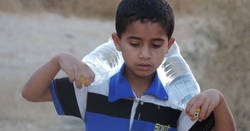
The Palestinian residents in the villages and towns of Salfit province have accused Israel of persisting in commandeering their water resources for its settlers and destroying their environment and lands with sewage and chemical waste from Ariel settlement.
The Salfit residents are complaining that Israel's water company, Mekorot, has considerably reduced the amounts of water provided for them in order to meet the needs of Ariel settlement.
Local researcher Khaled Maali, who monitors settler activities in Salfit, said that the water deprivation policy pursued by Israel in Salfit in particular aims to curtail its construction activities and growing population.
Maali added that the Israeli government wants to make Ariel settlers outnumber the Salfit natives, pointing to remarks made previously by premier Benjamin Netanyahu in which he called Ariel settlement " the balcony of Tel Aviv."
According to him, Salfit is a strategic area to the Israeli government because of its location over the most prolific aquifer in the West Bank, so such policy aims to force the natives to leave to other areas.
The Salfit residents are complaining that Israel's water company, Mekorot, has considerably reduced the amounts of water provided for them in order to meet the needs of Ariel settlement.
Local researcher Khaled Maali, who monitors settler activities in Salfit, said that the water deprivation policy pursued by Israel in Salfit in particular aims to curtail its construction activities and growing population.
Maali added that the Israeli government wants to make Ariel settlers outnumber the Salfit natives, pointing to remarks made previously by premier Benjamin Netanyahu in which he called Ariel settlement " the balcony of Tel Aviv."
According to him, Salfit is a strategic area to the Israeli government because of its location over the most prolific aquifer in the West Bank, so such policy aims to force the natives to leave to other areas.
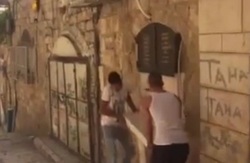
The Israeli occupation police on Wednesday forced the family of martyr Abu Ihab Hashima to remove a sebil (public water fountain) from the wall of their house on a street in the Old City of Occupied Jerusalem.
The family of Hashima had to remove the sebil after the police threatened to forcibly demolish it and make it pay a heavy fine.
According to the family, the fountain was intended to provide water for the Muslim worshipers who go to the Aqsa Mosque through Aqabat al-Khalidiya street in the Old City.
The police took this measure after a horde of Jewish settlers living in an outpost on the street filed a complaint about it.
The removed fountain was located about four meters away from a memorial the settlers had built on the same street after one of them had been killed in al-Khalidiya neighborhood in 1988.
The family of Hashima had to remove the sebil after the police threatened to forcibly demolish it and make it pay a heavy fine.
According to the family, the fountain was intended to provide water for the Muslim worshipers who go to the Aqsa Mosque through Aqabat al-Khalidiya street in the Old City.
The police took this measure after a horde of Jewish settlers living in an outpost on the street filed a complaint about it.
The removed fountain was located about four meters away from a memorial the settlers had built on the same street after one of them had been killed in al-Khalidiya neighborhood in 1988.
21 june 2016
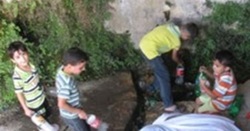
Since the start of the current month, tens of thousands of Palestinians in some West Bank areas have been suffering from a drastic cut in the piped water supplied to them by Israel’s Mekorot water company.
In the Salfit region of the West Bank and in three villages east of Nablus, homes have had no running water for more than two weeks.
Factories there have been shut down, gardens and plant nurseries have been ruined and animals have died of thirst or been sold to farmers outside the affected areas, according to a report published by Haaretz newspaper on Monday.
The Palestinians in those areas had to face this problem through taking water from agricultural wells, or by buying mineral water or paying for water brought in large tankers for household use and to water their livestock.
People at Mekorot told Palestinian water authority officials that the supply cuts were going to last the entire summer.
They claimed there was a water shortage and that the water cuts were necessary to assure that the local reservoirs (located in the settlements) stay full so that the necessary pressure can be maintained to stream the water through the pipelines leading to other settlements and Palestinian communities.
However, Palestinian municipal officials said that workers for the Israeli civil administration who were sent to regulate the quantities of water in the Mekorot pipes told them the cuts were made to meet the settlements' growing demand for water, especially in the hot weather.
In the Salfit region of the West Bank and in three villages east of Nablus, homes have had no running water for more than two weeks.
Factories there have been shut down, gardens and plant nurseries have been ruined and animals have died of thirst or been sold to farmers outside the affected areas, according to a report published by Haaretz newspaper on Monday.
The Palestinians in those areas had to face this problem through taking water from agricultural wells, or by buying mineral water or paying for water brought in large tankers for household use and to water their livestock.
People at Mekorot told Palestinian water authority officials that the supply cuts were going to last the entire summer.
They claimed there was a water shortage and that the water cuts were necessary to assure that the local reservoirs (located in the settlements) stay full so that the necessary pressure can be maintained to stream the water through the pipelines leading to other settlements and Palestinian communities.
However, Palestinian municipal officials said that workers for the Israeli civil administration who were sent to regulate the quantities of water in the Mekorot pipes told them the cuts were made to meet the settlements' growing demand for water, especially in the hot weather.

It seems that we are standing in front an intensified zionist strategy to poison the wells of the Palestinians to commit genocide against them and force them out again from their homes and villages, like what they have already done for long as it was explained by the jewish historian Ilan Pappe.
This is not a new zionist technique but they have been using it since the inception of the zionist state as a mean to kill and ethnically cleanse the natives, as the zionists were the first to introduce and use the chemical weapons in the Middle East .In May 1948 the Zionist gangs besieged the well-fortified Palestinian city of Acre, which could stand the siege for a long time.
The city water supply came from a nearby village name Kabri through an aqueduct. To shorten the siege and to enter the city, the Zionist gangs injected typhoid in the aqueduct. Many Palestinians and some 55 British soldiers, who were in the city, got infected. This crime was called operation “Shlach Lachmecha” as described by the Israeli military historian Urin Milstein [Wendy Barnaby’s “The Plague Makers: The Secret World of Biological Warfare”, London, Vision Paperbacks, 1997, pp 114-116]
During the Ethnic cleansing of Palestine 1947-1948, this technique of poisoning the wells was used in different villages in Palestine- which was documented by both the International Red Cross and the British Mandate authorities- in a systematic way to cause panic and force the Palestinians out of their villages for the zionist settlers.
This was not the only case……….. on the 6th May of the same year, many cases of typhoid erupted suddenly in the area. The British Army and Red Cross medics found 70 cases of the disease. It was clear that the disease was coming from the water source and was not being caused by poor sanitation, as the Israelis claimed. A week before the British left Palestine, the British Mandate Authorities instructed the Arab residents of Israel to drink water only from the city’s wells. They started to chlorinate the aqueduct. The Zionists’ claim that poor sanitation caused the epidemic was dismissed when 55 British soldiers were also infected and rushed to the Royal Hospital in Port Said Egypt….
This didnt happen only during the ethnic cleansing of Palestine in 1947-8, but it followed for long after that. As an integral part of the ethnic cleansing process, the zionists used to raze the native villages and poison the wells to prevent any expelled native from coming back as an Israeli historian explained:
Israeli military historian, Uri Milstein, eclaims that during this period, “in many conquered Arab villages, the water supply was poisoned to prevent the inhabitants from coming back.” According to Milstein, the typhoid epidemic that occurred in the Palestinian village Acre before it fell to Jewish terrorists was a deliberate biological attack and not just a coincidence of war.
However, the criminal zionists continued, and are still continuing their criminality while the world is turning a blind eye, hoping for the beast to be tamed.
Sara Leibovitz-Dar is a persistent investigative journalist. The trauma experienced by her parents in their native Lithuania left an indelible mark on her. She abhorred injustice and, particularly, the meek acceptance of it. She investigated the Gaza and Acre poisoning and shooting down of the civilian Libyan aircraft. The Israeli military historian, Uri Milstein, identified for her the names of the officers responsible for biological crimes.
In the recent years, the zionist settlers have repeatedly poisoned the wells of the Palestinian villages in reported news killing hundreds of goats, sheep and cows where the the Palestinians herd their cattle, and the surprise is that none of the zionist settlers was arrested or accused in any crime.
This is not a new zionist technique but they have been using it since the inception of the zionist state as a mean to kill and ethnically cleanse the natives, as the zionists were the first to introduce and use the chemical weapons in the Middle East .In May 1948 the Zionist gangs besieged the well-fortified Palestinian city of Acre, which could stand the siege for a long time.
The city water supply came from a nearby village name Kabri through an aqueduct. To shorten the siege and to enter the city, the Zionist gangs injected typhoid in the aqueduct. Many Palestinians and some 55 British soldiers, who were in the city, got infected. This crime was called operation “Shlach Lachmecha” as described by the Israeli military historian Urin Milstein [Wendy Barnaby’s “The Plague Makers: The Secret World of Biological Warfare”, London, Vision Paperbacks, 1997, pp 114-116]
During the Ethnic cleansing of Palestine 1947-1948, this technique of poisoning the wells was used in different villages in Palestine- which was documented by both the International Red Cross and the British Mandate authorities- in a systematic way to cause panic and force the Palestinians out of their villages for the zionist settlers.
This was not the only case……….. on the 6th May of the same year, many cases of typhoid erupted suddenly in the area. The British Army and Red Cross medics found 70 cases of the disease. It was clear that the disease was coming from the water source and was not being caused by poor sanitation, as the Israelis claimed. A week before the British left Palestine, the British Mandate Authorities instructed the Arab residents of Israel to drink water only from the city’s wells. They started to chlorinate the aqueduct. The Zionists’ claim that poor sanitation caused the epidemic was dismissed when 55 British soldiers were also infected and rushed to the Royal Hospital in Port Said Egypt….
This didnt happen only during the ethnic cleansing of Palestine in 1947-8, but it followed for long after that. As an integral part of the ethnic cleansing process, the zionists used to raze the native villages and poison the wells to prevent any expelled native from coming back as an Israeli historian explained:
Israeli military historian, Uri Milstein, eclaims that during this period, “in many conquered Arab villages, the water supply was poisoned to prevent the inhabitants from coming back.” According to Milstein, the typhoid epidemic that occurred in the Palestinian village Acre before it fell to Jewish terrorists was a deliberate biological attack and not just a coincidence of war.
However, the criminal zionists continued, and are still continuing their criminality while the world is turning a blind eye, hoping for the beast to be tamed.
Sara Leibovitz-Dar is a persistent investigative journalist. The trauma experienced by her parents in their native Lithuania left an indelible mark on her. She abhorred injustice and, particularly, the meek acceptance of it. She investigated the Gaza and Acre poisoning and shooting down of the civilian Libyan aircraft. The Israeli military historian, Uri Milstein, identified for her the names of the officers responsible for biological crimes.
In the recent years, the zionist settlers have repeatedly poisoned the wells of the Palestinian villages in reported news killing hundreds of goats, sheep and cows where the the Palestinians herd their cattle, and the surprise is that none of the zionist settlers was arrested or accused in any crime.
20 june 2016
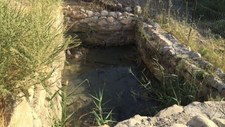
The Israeli occupation army's civil administration intends to destroy a water-holding reservoir that serves 20 Palestinian Bedouin families in a village in the northern Jordan Valley at the pretext of unlicensed construction.
This is taking place despite the fact that Israel’s coordinator of government activities in the occupied territories promised representatives of international agencies that there would be no demolitions during the holy month of Ramadan, except for structures built during this time, according to Haaretz newspaper.
This simple structure collects water coming out of a natural spring. A rubber hose attached to it runs for a few dozen meters to a plastic tank. The civil administration claims the structure was built illegally.
These families, who live in a community called Umm al-Jimal, own 700 sheep and goats as well as 300 cows and some horses. Last year, a flood destroyed another holding reservoir that served the families, and blocked the spring’s exit.
The families are concerned that destroying the current pond will once more block the spring, which is their only close water source.
A final injunction to demolish the pond was given in April 2012, but was never executed. Last Tuesday, an Israeli inspector posted a notice concerning filing reservations against the demolition order for a 10-meter-square pool of water.
At the time, the residents were given three days to present their reservations at the civil administration.
However, those days ended and the residents did not know if an attorney from the Palestinian Authority had managed to file an objection in this regard on time, or whether officials would arrive in the coming days to remove the pond.
The Israeli army has become in control of 95 percent of the Jordan Valley following the 1967 war, and since then this region has been a closed military zone, where the Palestinians are prohibited to live or build in. Israel's systematic demolition policy in the Jordan Valley aim to force the natives to leave their areas.
This is taking place despite the fact that Israel’s coordinator of government activities in the occupied territories promised representatives of international agencies that there would be no demolitions during the holy month of Ramadan, except for structures built during this time, according to Haaretz newspaper.
This simple structure collects water coming out of a natural spring. A rubber hose attached to it runs for a few dozen meters to a plastic tank. The civil administration claims the structure was built illegally.
These families, who live in a community called Umm al-Jimal, own 700 sheep and goats as well as 300 cows and some horses. Last year, a flood destroyed another holding reservoir that served the families, and blocked the spring’s exit.
The families are concerned that destroying the current pond will once more block the spring, which is their only close water source.
A final injunction to demolish the pond was given in April 2012, but was never executed. Last Tuesday, an Israeli inspector posted a notice concerning filing reservations against the demolition order for a 10-meter-square pool of water.
At the time, the residents were given three days to present their reservations at the civil administration.
However, those days ended and the residents did not know if an attorney from the Palestinian Authority had managed to file an objection in this regard on time, or whether officials would arrive in the coming days to remove the pond.
The Israeli army has become in control of 95 percent of the Jordan Valley following the 1967 war, and since then this region has been a closed military zone, where the Palestinians are prohibited to live or build in. Israel's systematic demolition policy in the Jordan Valley aim to force the natives to leave their areas.
18 june 2016

The Palestinian national office for the defense of land and resistance of settlement warned of the dangers and consequences of the Israeli rabbis’ advisory opinion permitting settlers to poison the running water in cities and towns of the West Bank.
In its weekly report, the office on Saturday pointed to the advisory opinion by Rabbi Shlomo Mlmad, the chairman of the so-called Council of Rabbis in West Bank settlements, which was disclosed by the Israeli organization 'Break the Silence'.
Yehuda Shaul, of Break the Silence organization, said that the aim behind poisoning water in the West Bank is pushing Palestinians to leave their towns and cities to pave the way for settlers who look forward to take over their lands.
In its weekly report, the office on Saturday pointed to the advisory opinion by Rabbi Shlomo Mlmad, the chairman of the so-called Council of Rabbis in West Bank settlements, which was disclosed by the Israeli organization 'Break the Silence'.
Yehuda Shaul, of Break the Silence organization, said that the aim behind poisoning water in the West Bank is pushing Palestinians to leave their towns and cities to pave the way for settlers who look forward to take over their lands.
13 june 2016
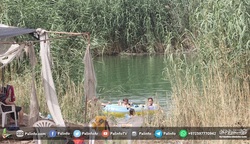
Palestinian villages east of Nablus have been suffering from a water shortage after Israeli water company Mekorot cut water supplies without prior notice, angering residents who point out that the quota for neighboring Jewish settlements is much higher.
Since the beginning of the holy month of Ramadan, Mekorot had begun lowering the water quota for three Palestinian villages east of Nablus, causing water pressure to drop, leaving their residents without running water for 21 days.
The local official Abdulkarim Hussein said that 80,000 cubic meters of water were allocated for the three villages per hour. However as drought is common in the mid-summer, only 25,000 cubic meters of water become available for the villages.
The residents have been forced to purchase high-priced water from local companies, or carrying buckets from municipal wells, he added. According to Palestinian official data, Israel takes about 85% of the aquifer's flow, leaving the Palestinians with 15%. In the 1967 war Israel gained exclusive control of the waters of the West Bank and the Sea of Galilee.
Israeli settlers have access to 700 liters of water per day, according to the Emergency Water, Sanitation and Hygiene group (EWASH), while the West Bank average is around 70 liters, below the World Health Organization’s recommended minimum of 110 liters per day for basic sanitation, hygiene and drinking.
Since the beginning of the holy month of Ramadan, Mekorot had begun lowering the water quota for three Palestinian villages east of Nablus, causing water pressure to drop, leaving their residents without running water for 21 days.
The local official Abdulkarim Hussein said that 80,000 cubic meters of water were allocated for the three villages per hour. However as drought is common in the mid-summer, only 25,000 cubic meters of water become available for the villages.
The residents have been forced to purchase high-priced water from local companies, or carrying buckets from municipal wells, he added. According to Palestinian official data, Israel takes about 85% of the aquifer's flow, leaving the Palestinians with 15%. In the 1967 war Israel gained exclusive control of the waters of the West Bank and the Sea of Galilee.
Israeli settlers have access to 700 liters of water per day, according to the Emergency Water, Sanitation and Hygiene group (EWASH), while the West Bank average is around 70 liters, below the World Health Organization’s recommended minimum of 110 liters per day for basic sanitation, hygiene and drinking.
12 june 2016
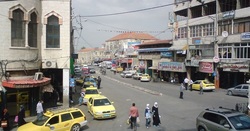
The Jenin municipality raised concern over Israeli intents to cut off water supplies to the city as a punitive measure against the Palestinians.
Jenin Mayor Ragheb Nader Haj Hassan warned in a press statement that the Israeli Mekorot Company might cut off water supplies to Jenin province without prior notifications.
The mayor spoke out against the serious repercussions of the move particularly in light of the burning temperatures accompanying the summer season.
He held the Israeli occupation authorities responsible for any tragic upshots to be generated by Israel’s violation of a deal struck with the Palestinians to supply Jenin with needed water supplies.
Over recent years, restrictions by the Mekorot Company aggravated the water crisis that has rocked Jenin province especially with the advent of the summer season.
Jenin Mayor Ragheb Nader Haj Hassan warned in a press statement that the Israeli Mekorot Company might cut off water supplies to Jenin province without prior notifications.
The mayor spoke out against the serious repercussions of the move particularly in light of the burning temperatures accompanying the summer season.
He held the Israeli occupation authorities responsible for any tragic upshots to be generated by Israel’s violation of a deal struck with the Palestinians to supply Jenin with needed water supplies.
Over recent years, restrictions by the Mekorot Company aggravated the water crisis that has rocked Jenin province especially with the advent of the summer season.
10 june 2016
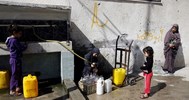
Israeli water company Mekorot on Thursday cut water supplies to some areas in the northern West Bank without prior notice, the Palestinian Water Authority (PWA) said.
PWA also said in a press statement that the northern towns of the West Bank especially in Salfit and Jenin were mostly impacted after the move by Mekorot.
The Authority denounced the Israeli company’s move especially that it came during the holy month of Ramadan.
The PWA said it is working to contact Mekorot, but is yet to receive a response.
Salfit Municipality has warned of a water crisis in Salfit after Mekorot’s decision to decrease 60% of water supplies allocated for the city. The Municipality called on local residents to decrease water use.
Israelis, including settlers, have access to 300 liters of water per day, according to the Emergency Water, Sanitation and Hygiene group (EWASH), while the West Bank average is around 70 liters, below the World Health Organization’s recommended minimum of 100 liters per day for basic sanitation, hygiene and drinking.
PWA also said in a press statement that the northern towns of the West Bank especially in Salfit and Jenin were mostly impacted after the move by Mekorot.
The Authority denounced the Israeli company’s move especially that it came during the holy month of Ramadan.
The PWA said it is working to contact Mekorot, but is yet to receive a response.
Salfit Municipality has warned of a water crisis in Salfit after Mekorot’s decision to decrease 60% of water supplies allocated for the city. The Municipality called on local residents to decrease water use.
Israelis, including settlers, have access to 300 liters of water per day, according to the Emergency Water, Sanitation and Hygiene group (EWASH), while the West Bank average is around 70 liters, below the World Health Organization’s recommended minimum of 100 liters per day for basic sanitation, hygiene and drinking.
7 june 2016
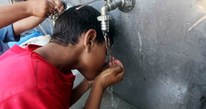
The Israeli occupation authorities on Sunday and Monday cut off water supplies to the central West Bank city of Salfit for unknown reasons.
According to the Salfit Municipality, water supplies were cut off on Sunday and Monday, the first two days of holy Ramadan month.
The municipality called on Palestinian citizens to rationalize consumption and buy reservoirs so as to limit the repercussions of the crisis.
Israeli water company Mekorot is the only source of water for Palestinians in Salfit city.
Palestinians’ water resources in the area have been exploited by the company, forcing Palestinians to buy limited quantities of water for steep prices while the surrounding Israeli illegal settlements have had unlimited access to water resources.
According to the Salfit Municipality, water supplies were cut off on Sunday and Monday, the first two days of holy Ramadan month.
The municipality called on Palestinian citizens to rationalize consumption and buy reservoirs so as to limit the repercussions of the crisis.
Israeli water company Mekorot is the only source of water for Palestinians in Salfit city.
Palestinians’ water resources in the area have been exploited by the company, forcing Palestinians to buy limited quantities of water for steep prices while the surrounding Israeli illegal settlements have had unlimited access to water resources.
30 may 2016
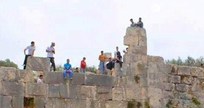
Israeli military bulldozers in Salfit leveled four ancient Palestinian historical villages in favor of an illegal settlement, locals said Monday.
Palestinian inhabitants of the Deir Ballout town said Israeli bulldozers leveled the Deir Kalaa and Deir Samaan archeological villages in western Salfit.
Eyewitnesses from the Brukin town also warned of the Israeli occupation authority's intents to isolate the Mughr al-Sahms village surrounded by the Ariel settlement factories.
Farmers from Salfit province said the Khirbet al-Shajara village was completely dismembered from its neighboring towns due to the Israeli apartheid wall.
The Palestinian natives of the area could no longer access the water wells and fertile lands which their forefathers have been cultivating for thousands of years.
Researcher in settlement affairs Khaled Maali said Israeli illegal settlement activity reduced several historical sites carved in stones and olive groves to rubble.
Palestinian inhabitants of the Deir Ballout town said Israeli bulldozers leveled the Deir Kalaa and Deir Samaan archeological villages in western Salfit.
Eyewitnesses from the Brukin town also warned of the Israeli occupation authority's intents to isolate the Mughr al-Sahms village surrounded by the Ariel settlement factories.
Farmers from Salfit province said the Khirbet al-Shajara village was completely dismembered from its neighboring towns due to the Israeli apartheid wall.
The Palestinian natives of the area could no longer access the water wells and fertile lands which their forefathers have been cultivating for thousands of years.
Researcher in settlement affairs Khaled Maali said Israeli illegal settlement activity reduced several historical sites carved in stones and olive groves to rubble.
27 may 2016
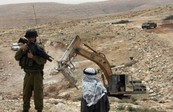
The Israeli Authorities decided to demolish homes, agricultural sheds, in addition to water and electricity networks, in Douma Palestinian village, south of Nablus, in the northern part of the occupied West Bank.
Ghassan Daghlas, a Palestinian official in charge of Israeli settlements’ files in the northern West Bank, said the army issued demolition orders against four homes, agricultural sheds and networks, in addition to an electricity grid.
He also said that the soldiers destroyed an agricultural road, east of Douma, preventing the villagers from reaching their lands.
The official further stated that the ‘Civil Administration Office’, run by the Israeli army in the occupied West Bank, has officially informed the Palestinians that their constructions and networks “were built without permits,” in areas that are under full Israeli control, and gave them 45 days to file appeals.
The demolition orders were issued against constructions belonging to the following Palestinians;
Ghassan Daghlas, a Palestinian official in charge of Israeli settlements’ files in the northern West Bank, said the army issued demolition orders against four homes, agricultural sheds and networks, in addition to an electricity grid.
He also said that the soldiers destroyed an agricultural road, east of Douma, preventing the villagers from reaching their lands.
The official further stated that the ‘Civil Administration Office’, run by the Israeli army in the occupied West Bank, has officially informed the Palestinians that their constructions and networks “were built without permits,” in areas that are under full Israeli control, and gave them 45 days to file appeals.
The demolition orders were issued against constructions belonging to the following Palestinians;
- Ali Dawabsha – Two-story home .
- Rezeq Dawabsha – A room and an agricultural shed.
- Marar family – Two-story home.
- Mohammad Faqeer – Three-story home.
- Ali Shadi Karshan – A Shed belonging.
- Electricity network – Ahmad Abdul-Khaleq Dawabsha.
- A 600-meter agricultural road.
25 may 2016
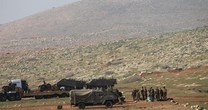
Israeli Occupation Forces (IOF) confiscated 1000-meter-long plastic water pipes that belong to the Palestinian farmer Abdulmahdi al-Salamain in al-Hadidiyah hamlet in the Jordan Valley and warned him of extending new water pipes.
The PIC reporter said that the hamlet, which is 33 kilometers far from east of Tubas, has been subjected to ceaseless demolition operations that affected most housing and agricultural facilities in the area by Israeli forces for the purpose of displacing its inhabitants.
The hamlet is inhabited by about 100 Palestinians who depend on agricultural and livestock for their living. They belong to Bsharat and Bani Odeh families who reside in Tammoun town in Tubas governorate.
The PIC reporter said that the hamlet, which is 33 kilometers far from east of Tubas, has been subjected to ceaseless demolition operations that affected most housing and agricultural facilities in the area by Israeli forces for the purpose of displacing its inhabitants.
The hamlet is inhabited by about 100 Palestinians who depend on agricultural and livestock for their living. They belong to Bsharat and Bani Odeh families who reside in Tammoun town in Tubas governorate.
19 may 2016
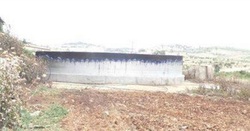
The Israeli occupation army on Wednesday afternoon informed Palestinian citizens of its intention to remove their agricultural water tanks in Beit Ummar town, north of al-Khalil city.
Media activist Mohamed Awad reported that an employee from the civil administration of the Israeli army escorted by soldiers handed demolition notices against four water tanks in the areas of Beit Zatta, al-Ferdaws, and Thagrat al-Shabk to the north and east of the town.
Awad told the Palestinian Information Center (PIC) that those tanks belong to citizens from the families of Abu Mariya and Barghit.
He pointed out that those agricultural tanks were built as part of a project funded by the European Union (EU) to develop Palestinian water sources and agricultural lands in the West Bank.
Media activist Mohamed Awad reported that an employee from the civil administration of the Israeli army escorted by soldiers handed demolition notices against four water tanks in the areas of Beit Zatta, al-Ferdaws, and Thagrat al-Shabk to the north and east of the town.
Awad told the Palestinian Information Center (PIC) that those tanks belong to citizens from the families of Abu Mariya and Barghit.
He pointed out that those agricultural tanks were built as part of a project funded by the European Union (EU) to develop Palestinian water sources and agricultural lands in the West Bank.
17 may 2016

Israeli water company Mekorot on Tuesday cut off supplies to the central West Bank city of Salfit for unknown reasons, the city municipality said Monday morning.
The municipality urged in its statement the local residents to rationalize water consumption and to take necessary precautionary measures.
The statement also called for storing enough water to meet their needs during the period of disconnection in order to avoid any water shortage.
One of the factors that explains Israel’s effort to take over land in the Salfit governorate is that its villages of Kafr Addik, Bruqin, Sarta and Biddyia are standing on the second largest aquifer in historical Palestine.
The water is exploited by Israeli water company Mekorot, which means that Palestinians have to buy limited resources of water for an excessive price while the surrounding settlements have access to an unlimited amount for a low price.
The municipality urged in its statement the local residents to rationalize water consumption and to take necessary precautionary measures.
The statement also called for storing enough water to meet their needs during the period of disconnection in order to avoid any water shortage.
One of the factors that explains Israel’s effort to take over land in the Salfit governorate is that its villages of Kafr Addik, Bruqin, Sarta and Biddyia are standing on the second largest aquifer in historical Palestine.
The water is exploited by Israeli water company Mekorot, which means that Palestinians have to buy limited resources of water for an excessive price while the surrounding settlements have access to an unlimited amount for a low price.
